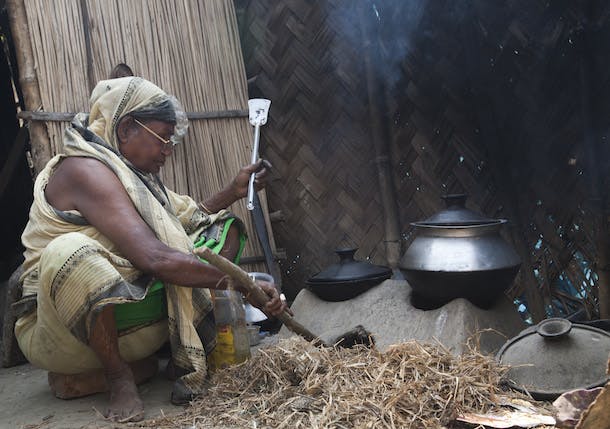
Every day, 3 billion people in the world cook their food on open fires or traditional cookstoves. They burn solid fuels such as wood, crop residues, dung, coal, and charcoal, producing smoke that kills more than 4 million people annually and sickens millions more.
In addition to the enormous health toll, this cooking method carries an enormous ecological burden; the emissions from the combustion of unsustainably harvested wood fuel alone accounts for roughly 2% of global greenhouse gas emissions.
The result is that one of our most fundamental activities – cooking a meal – is a major global health and environmental issue, as well as a significant barrier to sustainable economic development. Though cleaner, more efficient cooking technologies have been developed, they are often out of reach for families in developing countries due to cost or lack of availability in their local marketplace.
Buying carbon offsets from cleaner, more efficient cookstoves can help change that, as a growing number of forward-thinking corporations are discovering.
Purchasing carbon offsets or credits allows businesses to support low-carbon development in developing countries. In the clean cooking sector, offsets are helping to change the funding dynamic for cookstove projects from one that has traditionally relied on donor aid to one that attracts additional investment from the private sector. The revenues generated by the sale of offsets provides much needed funding to kick start the expanding clean cookstove market and helps to keep stove prices more affordable for the families using them.
Cleaner, more efficient cookstoves and fuels can offset one to two tonnes of CO2 emissions per year, while also improving health, quality of life, and livelihoods. A recent report by the Gold Standard Foundation found that a single clean cookstove carbon offset delivers USD$151 in economic co-benefits.
Marks & Spencer, a partner of the Global Alliance for Clean Cookstoves, has provided funds for 40,000 fuel efficient, lower pollution cookstoves to be manufactured, sold, and maintained by local entrepreneurs in Bangladesh. The plan is for the emissions reductions to be certified under The Gold Standard Carbon Credit Methodology for Efficient Cookstoves.
For M&S, supporting clean cookstove adoption with offset purchases is smart business. The need to act on climate change is urgent, and cookstove projects offer the unique opportunity to advance multiple sustainability goals simultaneously, including empowering women, creating economic opportunities for communities, and improving access to clean energy. The offsets have also helped M&S better achieve their broader sustainability goals including climate neutrality, supply-chain resilience, and stakeholder engagement.
To help companies like M&S more easily navigate the carbon offset marketplace, the Global Alliance for Clean Cookstoves created the Clean Cooking Carbon Credit Catalog. The catalog highlights clean cooking projects from around the world that offer companies and individuals the opportunity to offset almost 8 million tons of carbon dioxide annually.
As people around the world celebrate World Environment Day this week, now is an opportune time for more corporations to show climate leadership by offsetting their unavoidable emissions through clean cookstove carbon offset purchases. It’s not just good for the environment, it will also transform the lives and livelihoods of millions of families around the globe.
(Photo: Global Alliance for Clean Cookstoves. Location: Bangladesh.)



 View All Blog Posts
View All Blog Posts